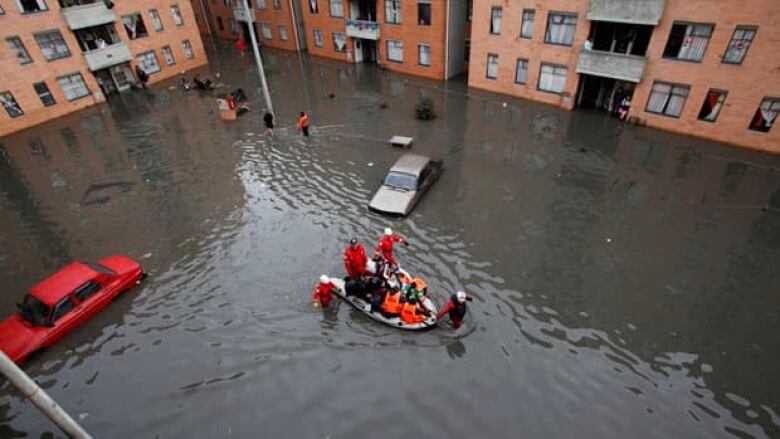Climate change linked to recent weather extremes
3 types of evidence combine to bolster scientific case

Human-caused climate change is indeed responsible for increasing incidents of extreme heat waves and rainfall over the past decade, a new,detailed scientificanalysis shows.
"Many lines of evidencestrongly indicate that some types of extreme event, most notably heat waves and precipitation extremes, will greatly increase in a warming climate and have already done so," said the paper published Sunday in Nature Climate Change by researchers at the Potsdam Institute for Climate Impact in Germany.
'It's like a game with loaded dice. A six can appear every now and then ... but now it appears much more often, because we have changed the dice.' Dim Coumou, Potsdam Institute for Climate Impact Research
However, it said the link between climate change and other types of extreme weather, such as storms, is less conclusive.
Scientists have long suggested that human-caused climate change could be leading to the increase in heat waves and devastating droughts andfloodsrecorded around the world over the past decade. Earlier, less comprehensive studies have provided some evidence that the link does exist. For example,two studies in February 2011linked global warming to a seven per cent increase in precipitationduring the most extreme storms in North America and to an increase in the likelihood of flooding in the U.K.
A report from the United Nations Intergovernmental Panel on Climate Change last November reported that deaths and damages from extreme weather and climate-related disastersare increasing significantly. That report also suggested that climate change is driving an overall increase in the number of warm days and the length and number of heat waves in many regions, along with heavier precipitation in some areas. However, it blamed the increase in losses primarily on socioeconomic factors, such asan increase in the number ofpeople living in areas vulnerable to flooding.
The new study examined three types of scientific evidence in an effort to provide a more conclusive link between extreme weather and climate change:
- Knowledge about the physics that drives weather patterns, which shows that warming will lead to more evaporation and therefore droughts on land. It also shows that warmer air will hold more moisture and can lead to heavier rainfall in other areas.
- Statistics, which show whether the number of recent extreme events is larger than would be expected if the climate were not changing.
- Computer models, which predict the response of climate systems to driving forces such as volcanic eruptions or human-caused global warming.
Each type of evidence has shortcomings, the study notes. For example, statistics can observe trends but can't determine their cause.
However, the researchers believe that when combined they provide "strong evidence linking specific events or an increase in their numbers to the human influence on climate."
For example, in the case of heat waves, the study found that the number of local monthly heat records around the globe is more than three times higher than it would be if the climate were not changing. The studycombined that information withmodels based on physics,whichshow that the riskof a heat wavelike one that scorched Europe in the summer of2003 has at least doubled but probably quadrupled because of human-caused changes to the climate. Together, the information shows a strong link between increasing heat waves and climate change.
The researchers noted that what is considered "extreme" is based on past experience and climate change "moves us out of the familiar range."
"It's like a game with loaded dice," said Dim Coumou, lead author of the paper, in a statement. "A six can appear every now and then, and you never know when it happens. But now it appears much more often, because we have changed the dice."












_(720p).jpg)


 OFFICIAL HD MUSIC VIDEO.jpg)
.jpg)



























































































